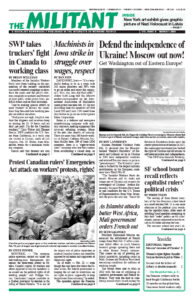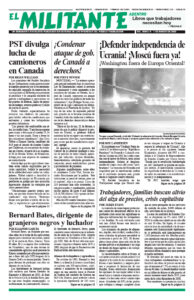President Emmanuel Macron announced the withdrawal of French troops from Mali Feb. 17 after a nine-year failed effort to crush Islamist terrorist groups operating there and in other former French colonies. This comes on top of growing political instability, including coups in Mali, Guinea and Burkina Faso amid worsening conditions for millions of working people.
The troops were sent to Mali in 2013 with the aim of stabilizing its capitalist government and French influence. They took the lead in combating armed rebels based among the Tuaregs — an oppressed ethnic minority of semi-nomadic herders and traders — and reactionary Islamist groups that had wrested control of the northern part of the country from central government control. The French intervention has been backed up by thousands of soldiers from African countries and some from Germany, fighting under the U.N. flag.
Even after the government regained control of the north, the Islamist groups continue to wreak havoc with hit-and-run attacks. They spread to bordering countries, including Burkina Faso, Mauritania and Niger, as well as to Chad and the coastal states of Benin, Ghana, Togo and Ivory Coast.
The Islamist groups take advantage of the deep economic and social crisis throughout the countries of the Sahel, which separates the Sahara desert to the north from the rest of Africa. This is intertwined with the legacy of colonial rule, including discrimination against minorities and divisions between herders and farmers. In Mali the Islamists are based mostly on the Fulani — semi-nomadic herders — and have clashed with self-defense groups based on the Dogon, who are mostly farmers.
Since 2015 thousands of civilians in the region have been killed either by the Islamist groups, including 1,300 in Mali, Niger and Burkina Faso in 2021 alone, or by government or French forces. Nearly 200,000 people have fled their homes. Since the start of the clashes with the Islamists in West Africa, 53 French soldiers have been killed, 48 of them in Mali.
The military in Mali carried out two coups — one in 2020 and another last year as French efforts to staunch the insurgency failed to end it. In December 2021 the Mali military invited the Russian-based Wagner Group to train its soldiers and provide security for government officials.
Decline of ‘la Francafrique’
Angry at Moscow’s meddling in what French imperialism considers “la Francafrique,” French Foreign Minister Jean-Yves Le Drian on Jan. 31 called the military government of Mali illegitimate and “out of control.” The next day the regime gave the French ambassador 72 hours to leave the country.
Macron said he will close the three French bases in Mali over the next six months and move their 2,400 troops to neighboring Niger. But Malian government spokesman Col. Abdoulaye Maiga demanded the French troops leave “without delay.”
Meanwhile, hundreds of mercenary thugs from the Wagner Group have started arriving. They won’t do any better than the French imperialist army against the Islamist groups.
Landlocked Mali, with a population of over 20 million, is the 13th poorest country in the world with a per capita gross domestic product of just $1,614 a year. The situation for the country’s herders, farmers and fishermen has worsened under the impact of economic sanctions imposed by the French-dominated Economic Community of West African States in the wake of the coup.
A similar crisis is unfolding in Burkina Faso. In 2014 a mass uprising there overthrew the despotic government of Blaise Compaore. He had seized power in a counterrevolution — welcomed by Paris — that overthrew the popular revolutionary government headed by Thomas Sankara in 1987.
On Jan. 24 the military in Burkina Faso overthrew its civilian regime, saying a heavier hand was needed to wage war against Islamist terrorists. At a rally the day after the coup, civilian supporters of the move waved Russian flags and held signs saying, “No to France!”
Over the last several decades, Beijing and China-based capitalist companies have increasingly entered into the competition to exploit the natural resources, markets and labor in the African continent. On a much smaller scale, Moscow has entered the fray, mostly with arms sales and offering its armed thugs.
In the years ahead the deepening world capitalist economic crisis will fuel even fiercer competition for African markets and resources, which include huge deposits of uranium, oil, gas, gold and more. As long as capitalist rule dominates Africa, Islamist violence will continue to seep through its pores. And it will be working people there who will pay the price.

